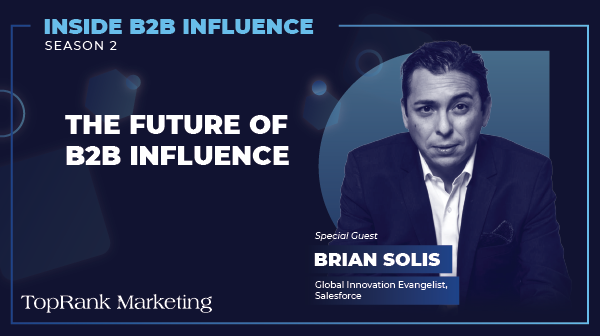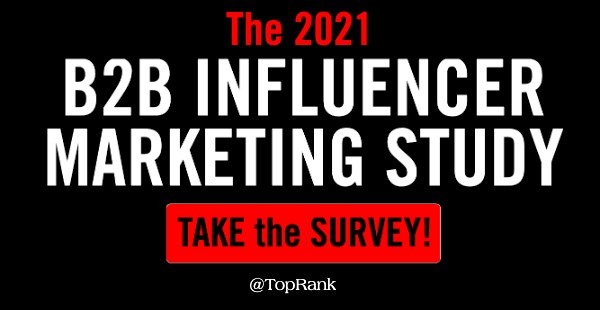
 If this is your first time, Inside B2B Influence is a podcast series that goes behind the scenes of B2B marketing and highlights insights with top business executives on influencer marketing for B2B companies. At TopRank Marketing we're doing our best to connect readers and listeners with B2B marketing insiders on strategies, trends, tactics and the future to elevate the practice of growing influence within and outside of B2B brands. In Episode 17 of Inside B2B Influence we have a returning guest who needs little introduction given his accomplishments and yet, we'd all be missing out if I did not mention that Brian Solis is Global Innovation Evangelist at Salesforce, an 8X best selling author, global keynote speaker, digital pioneer and has been a good friend for over 10 years. [caption id="attachment_30272" align="alignnone" width="500"]
If this is your first time, Inside B2B Influence is a podcast series that goes behind the scenes of B2B marketing and highlights insights with top business executives on influencer marketing for B2B companies. At TopRank Marketing we're doing our best to connect readers and listeners with B2B marketing insiders on strategies, trends, tactics and the future to elevate the practice of growing influence within and outside of B2B brands. In Episode 17 of Inside B2B Influence we have a returning guest who needs little introduction given his accomplishments and yet, we'd all be missing out if I did not mention that Brian Solis is Global Innovation Evangelist at Salesforce, an 8X best selling author, global keynote speaker, digital pioneer and has been a good friend for over 10 years. [caption id="attachment_30272" align="alignnone" width="500"] Lee, Valerie, Brian - 2008 (Photo: Brian Solis)[/caption] As someone who has been at the forefront of studying, innovating and practicing influence in the B2B business and technology world, I reached out to Brian for his thoughts on what the future holds for influence at B2B organizations inside and out, what to look for with business influencers and thoughts on how to scale influence. Highlights of episode 17 include:
Lee, Valerie, Brian - 2008 (Photo: Brian Solis)[/caption] As someone who has been at the forefront of studying, innovating and practicing influence in the B2B business and technology world, I reached out to Brian for his thoughts on what the future holds for influence at B2B organizations inside and out, what to look for with business influencers and thoughts on how to scale influence. Highlights of episode 17 include:
- Advantages influencer marketing creates for B2B brands in 2022
- The most important qualities B2B brands should look for in influencers
- The importance for B2B brands to grow influence from within
- The next evolution of influence for B2B companies
- What B2B companies should consider in order to scale influence
Transcript – Inside B2B Influence Episode 17: The Future of Influence for B2B Marketing
In the first ever research report on B2B influencer marketing, you shared that "in a time of darkness, chaos or confusion, B2B brands have an opportunity to be the light for their customers." As we finish off 2021 and head into another year of the pandemic, what kind of advantage does influencer marketing bring for B2B brands?Brian: I think it's more important than it's ever been and kudos to you for launching that first report. I understand that it was incredibly successful, so thanks for letting me be part of that. I'll try to connect the dots this way for those who are listening. At Salesforce, our mission is to help businesses, not just transform, but to be relevant and to thrive in what's going to be what I call, a novel economy. It's the word novel, like in novel coronavirus means new and unusual, and that means that we're heading into new years, a new genre of business without a playbook. When we take that stance, that means that we have to have a very solid position on how we're going to help you. What does business look like on the other side? What does every function look like on the other side? Marketing, sales and service? How do they all come together to essentially create the enterprise of the future right now? And so that's going to take a lot of work, a lot of thought leadership, a lot of content, a lot of video, a lot of articles, a lot of social media to reach those looking for insights - to connect the dots between valuable information and actions to those who need them.I think (B2B influencer marketing) is more important than it's ever been. @briansolis
In that regard, you can't just have the ideas. You can't just have the solutions. You also have to have the ability to connect the dots between those ideas and people who need them. So, in a sense, we have all become marketers now. And I think that's a good thing. I think marketing itself becomes a much more value added, it rises in the ranks of helping to serve, I guess, is the best way to put it, Not just to market or promote or to gain eyeballs, but to serve people. I think it's like a call to arms or this enlightenment that gives us a greater sense of purpose, a more noble sense of purpose. So with that said, I have a lot to read, a lot to learn and relearn in these times because there's certainly a lot of really smart people out there. I'm just hoping to continue to, not just think about ways to help companies, but to also think about ways to reach people their way. And that has me "control alt deleting" a lot of assumptions, that's for sure. B2B marketers have learned many lessons from our B2C counterparts including what makes an influencer. B2B influencers are more than experts with industry credentials. They are increasingly creators as well. What are the qualities most important in an influencer that brands should look for? Brian: Oh, man, let's start with the question of what makes an influencer. You know, I think back to some of the conversations, how many years have we been having these really these awesome conversations? I really appreciate how long we've known each other. We've done a lot of really cool things together. I think this is a time where it's almost as exciting as when we first met. You remember? Social media was just coming together. It was just chaos. It was the wild west. And I think this is that time. I don't know that people are going to pick up that it's that time, but it really is. I want to call it out for this reason. What is an influencer? Because coming into 2022 I think we could all have these visions of some beautiful human being on a beach in Thailand. Somebody walking and seeing their back with their hand extended holding their hand. You know, that's what I think a lot of traditional marketers think about in terms of influencer marketing. I'm not going to knock it. It has been, for B2C, some of the most innovative, creative stuff that I've seen in a long time. There's nothing to say though, that when it comes to B2B that you can't be human being either. I think that's really where we should start thinking about this.We have all become marketers now. @briansolis
I too, have been the recipient of these types of requests. Every single day I get emails, "we need you to be part of this. We want to give you some content to publish. Can you make a video? Can you do this?" And it's simply because of the number of people who follow my work. Very rarely does someone take the time to read my work and then reach out and talk about ways that we might be able to collaborate, because there was some idea that they felt could help them connect the dots of markets they're trying to cultivate. That's where it starts: who are you trying to reach and why? And then building bridges between those people who have earned the trust of those that you're trying to reach, whether it's a macro influencer, certainly in the B2B world, there are people with a lot of followers, more followers than I'll probably ever have. And at the same time they have reached the micro influence that is so critical right now. The people that you trust because they will tell you something specific that you need to do and you believe that their insights are going to help you succeed in how you're measured for success. I'm a big believer in experimenting. So I'll experiment with the wide swaths and the big audiences. But I also want to experiment with direct outcomes. If we can together, do some work that helps people make better decisions or move markets or launch products that help other companies, then that's what I'm talking about. For example, I remember some of my greatest work in the past, aside from what I'm doing right now. So I don't know that I've ever had so much fun while having such an impact, was back in the day with Google when we launched, we introduced the concept of micro-moments. Micro-moments was our way of helping marketers understand that a mobile first customer does not go through the web journey like a traditional customer sitting in front of a big screen or a laptop journey. You have to think about TikToK or Snapchat versus amazon.com, right, in terms of how you go through that. The work that we did cast a wide net because Google is very good at that. My responsibility was the micro stuff. Can we beat the drum of micro influence by talking about micro-moments in every single aspect of how a customer goes through the journey and what they're missing and what they need from marketers, from digital marketers, from web marketers to create that ideal journey.Every single day I get emails, "We need you to be part of this." Very rarely does someone take the time to read my work and then reach out and talk about ways that we might be able to collaborate. @briansolis
So, we talked about micro-moments, we talked about mobile first things. We talked about stats, we ran all kinds of research. We did micro-moments for travel, micro-moments for insurance and micro-moments for auto sales. I was a mad man during that first year to 18 months, every single day developing new content, putting it in the places that were going to reach those people. If I didn't have that audience, I would go build that audience. That was my life for a year and a half. And I think the result of that is that everybody knows about micro moments and it's still important after all of these years today. But that was the hard work, dedicated work of cultivating those communities, not just relying on somebody because they had the numbers. I think that in this post pandemic economy that's going to start taking shape, as soon as we can get people vaccinated, that the new world, that next normal needs more work like that. Not just intention to promote stuff, but to build stuff, to help those who are looking for insights, understand that we can build that playbook together.If I didn't have that audience, I would go build that audience. @briansolis
I think there's a lot of people asking questions. There's a lot of people looking for help. For those influencers who are going to take the time to think about it, not just promote or say something, or try to get a lot of views or clicks or what have you. But to think about like honestly think about, what is your problem? How has the world changed and how can I help you? And then go create around that. That's the answer to your question. That's what makes an influencer and it's not even an influencer at that point. That's a business partner who's helping you and helping others solve problems and create opportunities. One of the significant trends we've seen with many enterprise B2B brands is growth of investment in building influence from within. This comes in the form of employee advocacy programs as well as building thought leadership and influence for key executives by collaborating on content with industry experts. How important is it for B2B brands to grow influence from within? Brian: Such a great question. I joined this company because I wanted to be part of this culture. The Ohana, it is a very special culture, They, we, I should say, believe in that employee advocacy and empowerment. Because the frontline for us are those individuals who are having to help our customers solve some pretty big problems and transform overnight like most companies that got hit in March, 2020 with remote work and e-commerce, and chat bots and automation, and all of the things that had accelerated roadmaps, digital transformation roadmaps by 10 years. So Mark Benioff, at our big corporate kickoff get together, he talked about how we all need to as individuals, as employees of the organization, not just sell technology, which is a really big thing for a CEO of a hyper-growth company to say. He was basically saying, he wants all of us to think about the outcomes that our customers are trying to solve for and the things that they don't know, that they need to solve for and go be that go be that person, go be that resource so that they can trust you beyond just being a sales person or a service person.What is your problem? How has the world changed and how can I help you? Go create (content) around that. @briansolis
That's a big call to all of us, right? Not just me and my colleagues who do this every single day, but for everybody. That's employee advocacy. It's the belief in your people that they can provide solutions and help, not just the things that are going to hit the bottom line. To build relationships, as my colleague Henry King, and I have written about it in a serious this last year, we talk about relationship transformation. What do you want the employee to do, or employees do in aggregate and as individuals? Well, essentially it's to build relationships. You know this better than anybody. You build relationships by adding value and consistently adding value.Employee advocacy is the belief in your people that they can provide solutions and help. @briansolis
To do that, it means you have to understand what value looks like. Value is in the eye of the beholder. Then you train, you empower, you re-skill or skill to help people get there. And then you measure that because we're all in the relationship business. You measure the relationships that you want to see come to life. Then business outcomes are natural byproducts of investing in those relationships. So then it's not just a conversation. How can we empower employees to create, to share, to answer questions that maybe haven't been asked and to answer those questions en masse so that a lot of people find those answers. Essentially you build an infrastructure that can help create that type of advocacy. I think that's a pretty big deal, going beyond all of the apps to see, hey, what is it like to work there? You really start to invest in the culture where part of that culture is, you have smart people who are sharing smart things. I think that's part leadership, but also you need a program that isn't just about ghost writing for executives. It's really about giving a voice to the executive who actually believes in those things and scaling them. Thank you Brian! You can find Brian on Twitter, LinkedIn, his website and you can watch Brian along with his co-host John Kao and special guests on their Intersections show every Thursday morning at 10:30am PT. Be sure to stay tuned to TopRank Marketing’s B2B Marketing Blog for our next episode of Inside B2B Influence where we’ll be answering the B2B marketing industry’s most pressing questions about the role of influence in business to business marketing.Business outcomes are natural byproducts of investing in relationships. @briansolis
Have you taken the 2021 B2B Influencer Marketing Survey?
 Help elevate the practice of influence in B2B marketing by sharing your experience and opinions about B2B marketing and working with influencers in our latest research project. The survey takes just 10 minutes and you'll not only get an advanced copy of our research report featuring insights from Brian Solis and an incredible mix of B2B industry experts, but we're also giving away some sweet incentives. Take the survey today though, because we'll be closing it down soon.
Help elevate the practice of influence in B2B marketing by sharing your experience and opinions about B2B marketing and working with influencers in our latest research project. The survey takes just 10 minutes and you'll not only get an advanced copy of our research report featuring insights from Brian Solis and an incredible mix of B2B industry experts, but we're also giving away some sweet incentives. Take the survey today though, because we'll be closing it down soon.
The post Inside B2B Influence: Brian Solis of Salesforce on the Future of Influence in B2B Marketing appeared first on B2B Marketing Blog - TopRank®.
Article Source: http://bathseoexpert.blogspot.com/2021/09/inside-b2b-influence-brian-solis-of.html
No comments:
Post a Comment